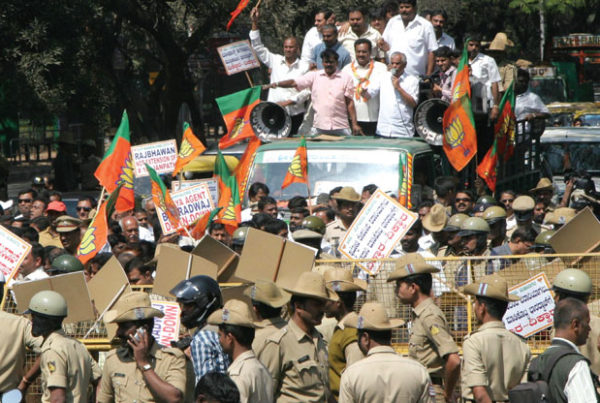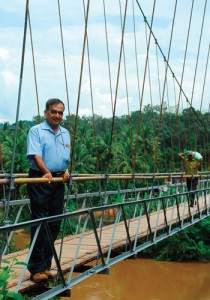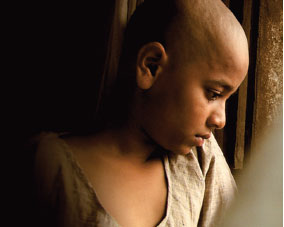 Illustration: Anand Naorem
Illustration: Anand NaoremDRESSED IN a canary yellow shirt and a yellower shoulder towel, Chandrababu Naidu adjusts the microphone and clears his throat aloud. The thousands squinting at the stage under the blazing heat of Guntur in Andhra Pradesh wait expectantly. “You will be happy to hear this,” says Naidu, smiling. Then, pointing to the heavens, he roars, “If we form the next government, the Telugu Desam Party (TDP) will give the poor people cash… CASH!” The crowd goes wild, applauding and cheering this baffling generosity.
Some 45 days before the state went to polls, this scene repeated itself across Andhra Pradesh endlessly. Cash is the newest sop hook on offer from the TDP. Under the Cash Transfer Scheme, Rs 2,000 will be transferred each month to the bank account of every housewife in the “poorest of poor” families. Once avowedly against subsidies and sops, Naidu has now pioneered the mother of all freebies.
Across political parties, sops seem to be the most popular formula for winning this general election. In states like Orissa and Andhra Pradesh, where assembly elections are being held along with the Lok Sabha polls, there has been a greater emphasis on please-all schemes. In Orissa, the Biju Janata Dal (BJD) led by Chief Minister Naveen Patnaik has announced sops for farmers and scholarships for youth if it is voted back to power. Last year, Patnaik had arranged rice for Rs 2 per kg, which paid immediate dividends in the state civic polls. Now, he has bested his own record and that of the BJP’s, offering BPL families rice at Re 1 per kg.
Cheap rice has gradually become the symbol of appeasement, with every party turning the election campaign into a nationwide haggle. Many believe it could be a poll game changer. Orissa MP, BJD’s BJ Panda says, “India’s democracy has an overwhelming majority of poor voters, who make all the difference.” However, there is no definitive evidence to show that freebies alone work. Parties that used them often brought more than just rice to the table.
IN ORISSA, NAVEEN PATNAIK HAS BESTED HIS OWN RECORD OF CHEAP RICE, NOW AT RE 1 PER KG
When it was first offered by Tamil Nadu’s Annadurai in 1967, it was three measures of rice for Re 1. The DMK swept the polls and Annadurai became the first non-Congress Chief Minister of Tamil Nadu, after which the Congress could never make a comeback. This is partly thanks to the rice offer, but primarily due to the more enduring Dravidian movement. As it turns out, the state could not afford the rice scheme after all.
Sixteen years later, NT Rama Rao of Andhra Pradesh, inspired by Annadurai, announced a massive rice subsidy: Rs 2 per kg for families below the poverty line. His 9-month-old TDP won more than twothirds of the assembly seats, replacing the grand old Congress. The rice scheme is often cited as the tactic behind TDP’s rise, but much of it was also NTR’s appeal as a charismatic and legendary film star. As a shrewd politician, he also strategically invoked and nursed the Telugu pride that was hurt when Rajiv Gandhi toured through Andhra Pradesh without meeting its Chief Minister. Cheap rice was only at the front of a larger scheme of things.
STILL, THE southern states, particularly Tamil Nadu till as recently as the 2006 assembly elections, have kept up the politics of rice. But it was only last year that the scheme crossed the Vindhyas. Offering 35 kg of rice at Rs 3 per kg, BJP’s Raman Singh was reelected Chief Minister of Chhattisgarh. Singh says that contrary to popular belief, the victory involved more than just the promise of cheap food. “Food is just one of the things people want. They got the first taste of my development-oriented government last term and voted for that again,” he says.
THE EXPENDITURE OF THE UPA GOVERNMENT, DUE TO FARM LOAN WAIVER, SHOT UP BY 19 PERCENT
A few months later, BJP’s Shivraj Singh Chauhan followed suit, forming a government in Madhya Pradesh with the promise of rice at Re 1 per kg. Today, Chauhan admits that it is proving cumbersome to fulfil. “It is a huge subsidy and at the time of recession, it is difficult for the state to keep the price so low,” he admits, “In most parts of MP, however, rice is available at Rs. 2 per kg.” Having seen governments ascend to power on the promise of free food, even national parties are fatally tempted to repeat that promise. Implementation be damned. The BJP offers 35 kg of wheat and rice per month at Rs 2. The Congress, 25 kg at Rs 3 per kg. That even ‘sure-shot’ rice politics may fail with too many players is not a consideration.
While cheap rice is the staple offer, there’s a plethora of other attractively packaged poll gifts. Telugu actor Chiranjeevi’s Praja Rajyam Party in Andhra Pradesh has promised Rs 100 worth of monthly provisions for a BPL family: 5 kgs rice, 1 kg Bengal gram, 1 litre cooking oil, half kg tamarind and 1 kg salt. He also throws in 10 hours of free power supply and free LPG connections for Rs 100. The BJP, too, has its share of doles in the state. The party has promised farm loan waivers for up to Rs 50,000 and will give free gold mangalsutrasto poor brides.
MAYAWATI HAS RESORTED TO WEDDING SOPS TO MAKE INROADS INTO RIVAL SP’S MUSLIM VOTE BANK
In Uttar Pradesh, Chief Minister Mayawati’s BSP has resorted to sops to make inroads into rival Samajwadi Party’s Muslim vote bank. In providing financial assistance for the weddings of daughters of poor Muslims, Mayawati has increased the allocation from Rs 1 crore to Rs 12 crore. Behind sops that are particularly for Muslims is crafty arithmetic. Mayawati’s present vote bank consists of Dalits and Brahmins, who are 21 and 14 percent respectively. Muslims, however, form 18.5 percent of the population in UP, and this is the number the BSP wants to transfer to itself.
Populist measures have always been around, but what may work politically may be disastrous economically. In February 1997, Punjab Chief Minister Prakash Singh Badal gave away free electricity and water to farmers. Says analyst Gurcharan Das, “Badal lived up to his electoral promise. But a year later, the state’s fragile finances were destroyed and there was no money to pay salaries to civil servants.” Development economist Utsa Patnaik says that it is a relief to see parties giving sops to farmers in the name of populism, rather than sops to corporates. “Unfortunately, it is not accompanied by structural reform of the agrarian sector, responsible for rural impoverishment in the first place,” she adds.
It seems for every gain made through populism, there is also a backlash. The Rs 40,000 crore tax sops given to invigorate the slowing economy led the UPA government’s revenues to drop by 6 percent last year. Meanwhile, expenditure shot up by 19 percent, which includes the ill-conceived Rs 71,860 crore farm loan waiver. “Politics is a short run game and overall growth is a long run one,” says Congress spokesperson Manish Tiwari, “A good party knows how to balance the two. The Congress-led government put people before politics, but now we have to bet greater stakes to come back to power.” The Congress now promises to waive interest for farmers who repay loans on time. The BJP meanwhile has slashed the interest rate on farm loans from 9 to 4 percent. If all the sops were in fact implemented, the bills would run up to Rs 23,000 crore for the Congress, and Rs 58,000 crore for the BJP.
There are several other sops, like the Congress’ free school to university education for dalits and adivasis. UP’s Mayawati has set aside Rs 5,000 crore to develop Hindu religious places like Ayodhya and Varanasi. Without exception, all of Andhra’s parties have promised to waive farm loans, give free homes and free power to the poor. Orissa’s BJD also offers free power and farm loans at 3 percent. If we were to judge by poll promises, India would be the world’s biggest welfare state.
Cash For Vote
The mother of all freebies is here. Andhra Pradesh’s TDP bypasses rice, TVs and loans, to promise hard cash, reports Sanjana
RS 2,000 for the poorest, Rs 1,500 for the poor and Rs 1,000 a month for the middle class. As election sops go, there’s no parallel to the ambitious cash transfer scheme (CTS) of the Telugu Desam Party (TDP) in Andhra Pradesh.
TDP’s main rivals, the Congress and actor Chiranjeevi’s Praja Rajyam Party, dismissed the CTS as “an election gimmick”. Union Finance Minister, P Chidambaram labelled it “an unfeasible scheme that came with huge costs.” Party chief Chandrababu Naidu, however, has persisted, to do the un-doable. Says a close aide of Naidu, “The CTS aims to apply innovation to poverty alleviation.”
CHANDRABABU NAIDU’S STANFORD-EDUCATED SON HAS MASTERMINDED THE DIRECT CASH TRANSFER SCHEME
N Lokesh, Naidu’s son and a Stanford MBA graduate, is the mastermind behind the scheme. In his campaigns, Naidu has talked of a similar direct cash scheme in Latin American countries. In the 2006 Brazil national elections, it had helped President Luiz da Silva get re-elected. Currently the world’s largest cash transfer programme, the Brazilian Bolsa Familia stipulates several key conditions for families to qualify. It’s likely that Naidu’s CTS too will have similar riders. The fine print, however, has not even been mentioned.
In 2001, Andhra’s population was above 7.5 crore, of which 2 crore are officially below the poverty line. At Rs 2,000 a month for every BPL family, the cost to the state exchequer will be Rs 48,000 crore a year. This is already well past Naidu’s estimate of Rs 20,000 crore. And he has yet to account for families above the poverty line and the middle class.
Ask how Rs 20,000 crore figure was arrived at and there are no answers. Ask how the number of middle class families will be detemined and more political rhetoric follows. “The modalities need to be worked out. But the first file that the TDP will sign will be to set up a commission to implement CTS,” says the aide.
—
This article was originally published in Tehelka, a leading independent news magazine in India, known for its investigative journalism.



